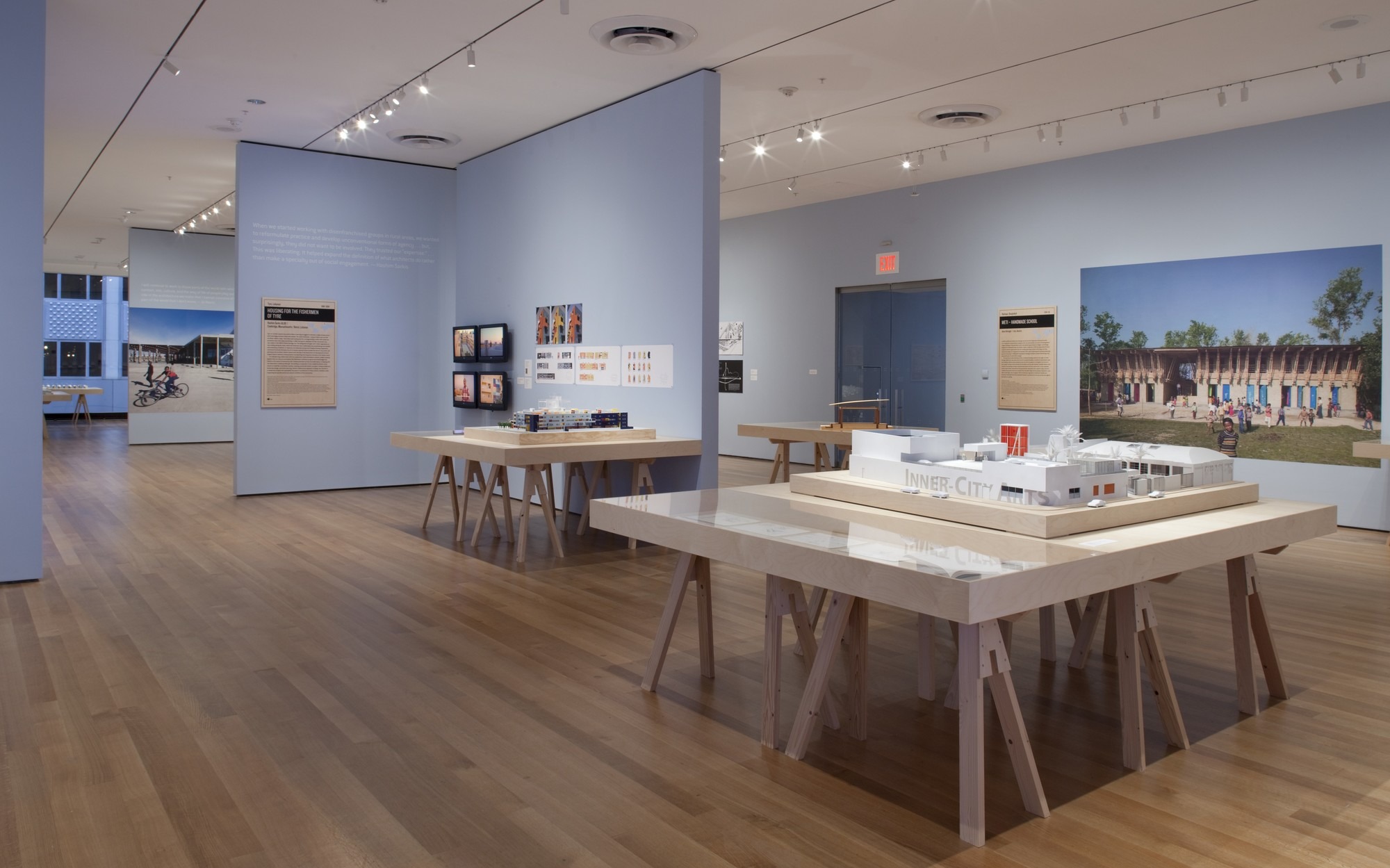Small Scale, Big Change
New Architectures of Social Engagement
03 Oct 2010 - 03 Jan 2011

Installation view of the exhibition, "Small Scale, Big Change: New Architectures of Social Engagement"
October 3, 2010–January 3, 2011. IN2130.16. Photograph by Thomas Griesel.
October 3, 2010–January 3, 2011. IN2130.16. Photograph by Thomas Griesel.
Special Exhibitions Gallery, third floor
Architecture can be a powerful means to change social conditions. Small Scale, Big Change presents eleven noteworthy projects, either built or currently under construction, in underserved communities around the world. The architects featured in the exhibition confront inequality using the tools of design. They engage social, economic, and political conditions, developing post-utopian architectural interventions that begin with an understanding of and deference to a community. Without sacrificing a concern for aesthetics, the architects develop projects that reveal a specificity of place; their architectural solutions emerge from close collaboration with future users and sustained research into local conditions. Small Scale, Big Change focuses on the process and final product, displaying materials that illustrate the complex and careful development of a design. These outstanding projects—including schools, community centers, housing, and infrastructural interventions—reveal an exciting change in the longstanding dialogue between architecture and its community, wherein the architect’s roles, methods, and responsibilities are dramatically reconsidered. Here, the architect is as much a moderator of social processes as a designer of a structure.
Small Scale, Big Change explores the following projects in depth: Primary School, Gando, Burkina Faso (Diébédo Francis Kéré, 1999–2001); Quinta Monroy Housing Project, Iquique, Chile (Elemental, 2003–05); Red Location Museum of Struggle, Port Elizabeth, South Africa (Noero Wolff Architects, 1998–2006); METI - Handmade School, Rudrapur, Bangladesh (Anna Heringer, 2004–06); Inner-City Arts, Los Angeles, California (Michael Maltzan Architecture, 1993–2008); Housing for the Fishermen, Tyre, Lebanon (Hashim Sarkis A.L.U.D., 1998–2008); $20K House, Hale County, Alabama (Rural Studio, 2004–present); Metro Cable, Caracas, Venezuela (Urban Think Tank, 2007–2010); Manguinhos Complex, Rio de Janeiro, Brazil (Jorge Mario Jáuregui, 2005–present); Transformation of Housing Block – Paris 17°, Tour Bois le Prêtre, Paris, France (Frédéric Druot, Anne Lacaton, and Jean Philippe Vassal, 2006–present); and Casa Familiar: Living Rooms at the Border and Senior Housing with Childcare in San Ysidro, California (Estudio Teddy Cruz, 2001–present). The exhibition is accompanied by a publication.
Organized by Andres Lepik, Curator, and Margot Weller, Curatorial Assistant, Department of Architecture and Design.
Architecture can be a powerful means to change social conditions. Small Scale, Big Change presents eleven noteworthy projects, either built or currently under construction, in underserved communities around the world. The architects featured in the exhibition confront inequality using the tools of design. They engage social, economic, and political conditions, developing post-utopian architectural interventions that begin with an understanding of and deference to a community. Without sacrificing a concern for aesthetics, the architects develop projects that reveal a specificity of place; their architectural solutions emerge from close collaboration with future users and sustained research into local conditions. Small Scale, Big Change focuses on the process and final product, displaying materials that illustrate the complex and careful development of a design. These outstanding projects—including schools, community centers, housing, and infrastructural interventions—reveal an exciting change in the longstanding dialogue between architecture and its community, wherein the architect’s roles, methods, and responsibilities are dramatically reconsidered. Here, the architect is as much a moderator of social processes as a designer of a structure.
Small Scale, Big Change explores the following projects in depth: Primary School, Gando, Burkina Faso (Diébédo Francis Kéré, 1999–2001); Quinta Monroy Housing Project, Iquique, Chile (Elemental, 2003–05); Red Location Museum of Struggle, Port Elizabeth, South Africa (Noero Wolff Architects, 1998–2006); METI - Handmade School, Rudrapur, Bangladesh (Anna Heringer, 2004–06); Inner-City Arts, Los Angeles, California (Michael Maltzan Architecture, 1993–2008); Housing for the Fishermen, Tyre, Lebanon (Hashim Sarkis A.L.U.D., 1998–2008); $20K House, Hale County, Alabama (Rural Studio, 2004–present); Metro Cable, Caracas, Venezuela (Urban Think Tank, 2007–2010); Manguinhos Complex, Rio de Janeiro, Brazil (Jorge Mario Jáuregui, 2005–present); Transformation of Housing Block – Paris 17°, Tour Bois le Prêtre, Paris, France (Frédéric Druot, Anne Lacaton, and Jean Philippe Vassal, 2006–present); and Casa Familiar: Living Rooms at the Border and Senior Housing with Childcare in San Ysidro, California (Estudio Teddy Cruz, 2001–present). The exhibition is accompanied by a publication.
Organized by Andres Lepik, Curator, and Margot Weller, Curatorial Assistant, Department of Architecture and Design.
